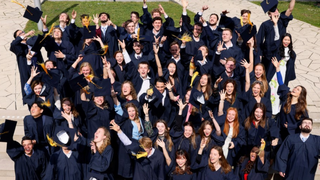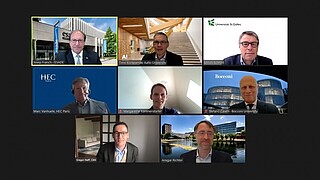The course has been selected by representatives of the CEMS Academic Committee because ‘it fosters an urging topic to the world. It also capitalises on the strengths of CEMS community as an effort of many CEMS schools within the network. The UNFCCC is especially stimulating with its focus, content, and design. It encompasses collaboration, impact, visibility, student involvement, and responsibility and has contributed for several years for values that are at the core of CEMS and has made the bonds between different CEMS schools stronger by uniting them on tackling a common theme, the climate change.’
Around 150 students per year take the elective, with usually about 35 of them taught at RSM by Dr Kennedy himself. The others study at CEMS’ partner business schools around the world. Once a year, students of this elective gather to enact a ‘model’ of the official UN Climate Change Conference; this two-day event for business students is called the Model United Nations Framework Convention on Climate Change (Model UNFCCC) and it was this year reported in the Financial Times.
Closing the knowledge gap
The Climate Change Strategy Roleplay elective and Model UNFCCC form an innovative educational approach to closing an acknowledged gap in the understanding of climate change, climate policy, and their effects on the future of business. The elective deals with the core issues of climate change and includes a wide range of effective didactic tools and exercises. Students study the background and consequences of climate change for business, and of corporate responses to it. It includes an exploration of international and national regulatory frameworks, and on emerging resource challenges and market opportunities.
Tackling the emergency needs knowledge
Tackling the climate emergency is the biggest challenge of this generation, says Dr Kennedy, but it’s not commonly taught in business schools, which is why he developed the elective. “I want to provide future business leaders with the knowledge, skills and attitude to create much-needed climate change solutions. I am incredibly proud to be teaching this course, to be part of a wonderful business school collective, and to play a small part in creating a better tomorrow.”
Dr Kennedy is an associate professor researching corporate sustainability, climate change and sustainability-oriented innovation at RSM. His current research interests include how systems and resilience thinking may be fostered within organisations and how this can be used to innovate new sustainable business models.
Determination to tackle climate change
He says he is impressed every year by students’ enthusiasm, creativity and determination to tackle the climate emergency. Their passion and drive is matched by their excellent appreciation of knowledge, and their practical skills, he says, particularly so at the model climate change conference during which students demonstrate “fantastic negotiation skills and are able to make breakthroughs that have not yet been possible in reality.”
The importance of the Climate Change Strategy elective grows every year as the global community continues to fail to substantially reduce greenhouse gases. The planet desperately needs new low carbon technologies, and new ways of doing business. Business students are eager to find the solution to the climate emergency. In Dr Kennedy’s opinion, electives such as this one are essential to the business school curriculum. “Many of our graduates have chosen to focus their careers on this challenge, and are now putting their new knowledge from the course into action in their everyday working lives.
“I am incredibly proud of all the students that have taken this elective, and especially the graduates that are already dedicating themselves to the cause.”
RSM alumna Noortje van Heijst is now working as a start-up investment consultant in the energy sector. She graduated from RSM’s MSc in Global Business and Sustainability in 2019 after taking the Climate Change Strategy elective; she also took part in the MUNFCCC. “It was a great course,” she said. “I chose it because of my personal interest in the climate change debate and to better understand the climate change negotiations on a global scale. Stepping into the shoes of a country or other party in the MUNFCCC was the most interesting part of the course for me.” Noortje took on the role of acting for the People’s Republic of China: “It was extremely interesting to dive deep into the interests of the world’s biggest emitter in the global climate change negotiations and learn more about the UN procedures,” she said.
“The course was balanced and included theory as well as practice and was a really valuable experience. It not only taught us how the UNFCCC works or what the climate change debate is about, but also gave real hands-on skills in negotiation strategies which I still use in my daily activities.”


